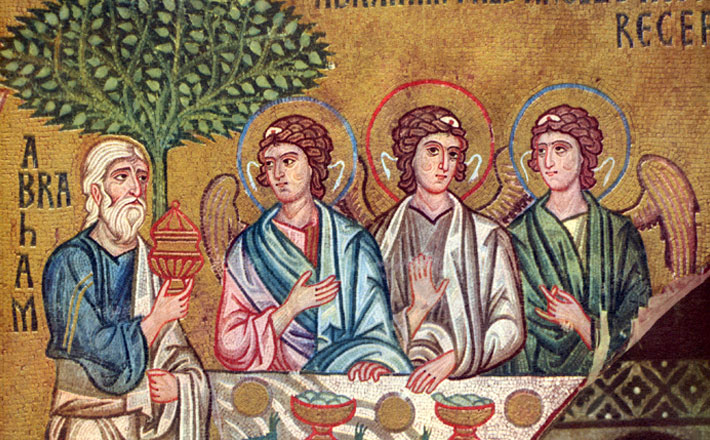Commentary on Amos 8:1-12
“Amos was Israel’s first theologian,” says scholar John Barton. “As far as we know, no one before him had subjected the religious beliefs and practices of people in Israel to critical scrutiny.”[1]
While Book of Amos is one of the last in the Old Testament, Amos was actually among the earliest ancient Israelite prophets and writers on record. As such, he gives us a glimpse at the way some ancient Israelites understood the nature of God. Operating in the mid-8th century, a good portion of the collection of material attributed to Amos is likely original to him, if not his disciples.
God and Israel shared a unique bond
Some of Amos’ ideas about the nature of God came to be well-known and accepted as ancient Israel’s theology developed. For example, while Amos doesn’t use the term covenant (as later biblical writers do), he certainly seems to have believed that God and Israel were in a special, if not contractual, type of relationship that was grounded in the Exodus story. The passage that best describes this connection can be found in Amos 3:2-3 where God calls out, “O people of Israel, against the whole family that I brought up out of the land of Egypt: You only have I known of all the families of the earth; therefore I will punish you for all your iniquities.” For Amos, this relationship signaled not just a unique connection to God, but also brought along with it significant responsibilities and punishment for not upholding them.
God’s active role
In addition, Amos 3:2-3 not only points to the particular relationship between God and Israel, it also reflects Amos’ understanding of God as an active force both in the life of Israel as well as other nations. Barton indicates that for Amos, God intervened in history primarily through politics (including war) and within nature. While today we might hesitate to make claims about God’s action in the political realm or in meteorological events, this idea was a commonplace for much of Jewish and Christian history. In fact, insurance policies still refer to floods, tornadoes, hurricanes, etc., as “acts of God.”
Today, we may be convinced, like Amos, that God does act, but are not always sure precisely how or why. For Amos, the basis of God’s action appears to have been morality — not narrowly understood as individual piety but rather as collective action for the common good. God can rescue the Israelites from Egypt on the one hand, but also subject them to famine or earthquakes on the other, all as a consequence of Israel’s behavior.
God’s irreversible judgment in 8:1-12
In looking at today’s passage from the end of the Book of Amos (8:1-12), alongside what we’ve seen in Amos 3, yet another theme emerges, one with which we are even less familiar and may make us quite uncomfortable. What Amos 3 and 8 make clear (along with many other passages) is that Amos saw God’s judgment against Israel as a fait accompli, a course of action that was already underway, one that was impossible to reverse.
Amos 8 opens with a vision in which God shows Amos a basket of summer fruit, fruit that is perhaps over-ripe, and teetering on the edge of going bad. God then tells Amos that this vision indicates that “The end has come upon my people Israel; I will never again pass them by. The songs of the temple shall become wailings in that day [and] the dead bodies shall be many, cast out in every place” (verses 2-3). The finality of the passage is clear; Israel has no recourse.
Indictment of Israel’s leaders
In the next segment of text, readers are provided with the reason for Israel’s demise. In an indictment against Israel’s leaders in words that are perhaps a restatement of Amos 2, God says “Hear this, you that trample on the needy, and bring to ruin the poor of the land…” The remainder of the passage (8:7-12) focuses on Israel’s punishment, describing a time when the land will tremble, the people will be in mourning, the sun will go down at noon, feasts will turn into mourning, songs into lamentation, and a famine of God’s word will encompass the land.
Collective vs. individual judgment
Amos the theologian was convinced that God’s punishment was collective, not individual, and that the whole would suffer because of actions of some. Not all biblical writers agreed with him, however; we begin to see changes in this view by the time that the prophet Ezekiel arrives on the scene in late 6th century and early 5th as the Kingdom of Judah is conquered and many of its inhabitants are taken into exile.
“The word of the Lord came to me,” says Ezekiel, “What do you mean by repeating this proverb concerning the land of Israel, ‘The parents have eaten sour grapes, and the children’s teeth are set on edge’? As I live, says the Lord God, this proverb shall no more be used by you in Israel. Know that all lives are mine; the life of the parent as well as the life of the child is mine: it is only the person who sins that shall die” (Ezekiel 18:1-4).
Challenges and opportunities in this text: the environment
Preaching this text poses some challenges, to say the least. Highlighting the unique relationship between God and God’s people, God’s active role in history, and God’s concern with justice, particularly among leaders, all “preach” well. But combining these ideas with the sense that God’s justice is irreversible and collective? Not so much. But what if we look at this from a different angle?
Amos was a working theologian, a man on the ground, responding to what he saw every day around him. All of us, as working theologians, try to do the same. And some of the issues we are grappling with appear to be both irreversible and collective. Take the environment, for example. This issue is not going away. It has been largely caused by the wealthy of the world using more than their share, and that is having already and will continue to have consequences for ALL of us, regardless of what we’ve done individually. Perhaps we can use Amos as a model, inspiring us to be courageous within our congregations. Following his lead, we can boldly consider the hard questions that confront us. Through preaching, teaching, conversation and debate, our churches can be places where we are not afraid to talk about things that really matter.
Note:
[1] Barton, John. The Theology of the Book of Amos (Old Testament Theology). Cambridge University Press (2012), p. 52.


July 21, 2013